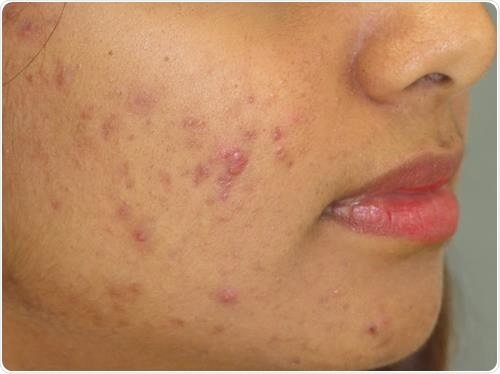Mar 25 2017
Growing up can be hard for any teenager without the added stress of acne. Sadly acne affects around 80% of adolescents aged 13-18 years at some point. Three out of five teenagers surveyed by the British Skin Foundation said that the biggest impact acne has on their lives is a fall in self-confidence.

Dr Anjali Mahto, Consultant Dermatologist & British Skin Foundation spokesperson explains:
Acne is a disorder of the pilosebaceous unit in skin, which is composed of a sebaceous gland (oil producing gland), hair follicle, and hair. Acne develops due to a complex interaction between excess oil production, bacterial proliferation, and “sticky” skin cells lining the hair follicle, which lead to inflammation.
Acne can have a number of appearances. It can present as a combination of comedones (blackheads and whiteheads), pus-filled spots (pustules) or deep painful red cysts. Its severity can vary from a few spots on the face, neck, back and chest to a more significant problem that may cause scarring and profound impact on self-confidence.
Despite acne being so common, there are still many misconceptions that surround it. Myths include that acne sufferers are dirty or don’t wash properly, that their diet is poor or that they will ‘grow out of it’. These myths play a huge part in the stigma surrounding the condition and the perception of it by non-sufferers.
In fact, British Skin Foundation statistics show that teenagers with acne can often be bullied by friends, family and even people they don’t know.
Our survey of 10-18 year-olds with acne found that
- 62% reported being verbally abused by friends, family or a person they know because of their acne
- 40% reported being verbally abused by a member of the public due to their acne
- 46% reported being bullied regularly due to their acne
Worryingly, this can lead to thoughts of self-harm or even suicide.
- 19% have contemplated suicide due to their acne, with another 4% actually attempting suicide
- 19% have considered self-harm and a further 16% have actually self-harmed
More positively, our survey discovered that almost half (48%) of 10-18 year-olds surveyed rely on their family for support for their acne.
It also revealed that over half (52%) of those surveyed have tried five or more treatments for their acne.
The British Skin Foundation’s Dr Anjali Mahto explains:
Acne, for the majority of people is a treatable skin disorder, and having suffered with it myself, I really do feel that no one should just have to live with it. A good dermatologist can offer a large number of potential treatments that can be tailored to the individual. Unfortunately, the skin is such a visible organ, that it's only natural that self-esteem is so closely tied to it.
People do underestimate acne and the impact it has on those suffering with it. I think these results highlight that acne should be taken far more seriously. It is important to seek help and advice early before scarring (be that mental or physical) develops and request referral to a dermatologist if treatments aren't working. We also need to investigate the psychological burden of this further.
Top tips for combatting acne by Dr Mahto include:
- Cleanse your face twice a day with a face wash designed for acne-prone skin. Products that contain salicylic acid and zinc may be beneficial. Exfoliate your skin weekly – this will remove the upper layer of skin cells, resulting in a brighter complexion and help reduce blackheads
- Try over the counter acne treatments such as benzoyl peroxide or salicylic acid to apply directly onto spots
- Avoid heavy cosmetics and products that will block pores and choose items that are oil-free and non-comedogenic
- See your GP or a dermatologist if your acne fails to respond to these measures, if you notice scarring, or it is starting to affect your self-esteem